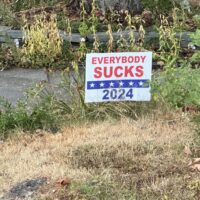

Photograph by Nathaniel St. Clair
“What if our campaigns were much, much shorter?” Ben Smith asks at Semafor. “The presidential campaign is currently a two-year cycle, which begins just after the prior midterm elections. … [Kamala] Harris is accidentally demonstrating the alternative: She’s the hot new thing in August, riding on vibes and goodwill six months after the Super Tuesday peak of modern campaigns.”
Wouldn’t it be nice if we only had to suffer a few short months (maybe even WEEKS) of presidential campaigning every four years?
That’s how it used to be, even in the days before radio, television, and the Internet, when campaigning was limited to the speed of rail transportation and print newspaper coverage. Until the 1970s, candidates often didn’t even announce until well into election years, and it was frequently impossible to know whom political parties would even nominate until their summertime national conventions. Campaigns were autumnal affairs, not multi-year slug-fests.
My main disagreement with Smith’s take is his idea that the modern American presidential campaign cycle only lasts two years. In reality, we live (as his piece’s title mentions) in the age of the “permanent campaign.”
By the time a president delivers his (perhaps, and maybe as early as next January, her) first inaugural address, the re-election campaign is already underway, and the campaigns of future opponents or successors are at least gassing up for the long drive.
Barack Obama, for example, clearly launched his 2008 presidential campaign within days of delivering a well-received speech at the 2004 Democratic National Convention. His ascent from the Illinois State Senate to short tenure in the US Senate was more looping campaign ad than regular career move.
President George H.W. Bush’s two sons both stopped by the politics store to pick up governorships, both with obvious intent to generate presidential buzz.
Then there’s Harris, who barely got her US Senate seat warm before swerving into the presidential nomination lane for 2020.
Adoption of Smith’s “compressed schedule” proposal (presidential primaries in July, conventions shortly thereafter) wouldn’t shut down
the “permanent campaign” nonsense in and of itself, but it might presage a cultural change in which perpectual “pick me” antics cost, rather than benefit, candidates.
Again, wouldn’t that be nice?
A cautionary note, however:
A shorter campaign season would merely provide a respite from the tiresome pageantry, not a solution to our bigger problems. It wouldn’t necessarily result in better government, even if we define “better” along the lines of Grover Norquist’s moderate prescription (“reduce it to the size where I can drag it into the bathroom and drown it in the bathtub”) rather than in terms of my own root and branch anarchist abolitionism.
As respites go, though, I’d joyously greet an end to the “permanent campaign.”
The post Election 2024: A Step Back From The Permanent Campaign? appeared first on CounterPunch.org.
This content originally appeared on CounterPunch.org and was authored by Thomas Knapp.
Thomas Knapp | Radio Free (2024-08-15T05:55:52+00:00) Election 2024: A Step Back From The Permanent Campaign?. Retrieved from https://www.radiofree.org/2024/08/15/election-2024-a-step-back-from-the-permanent-campaign/
Please log in to upload a file.
There are no updates yet.
Click the Upload button above to add an update.